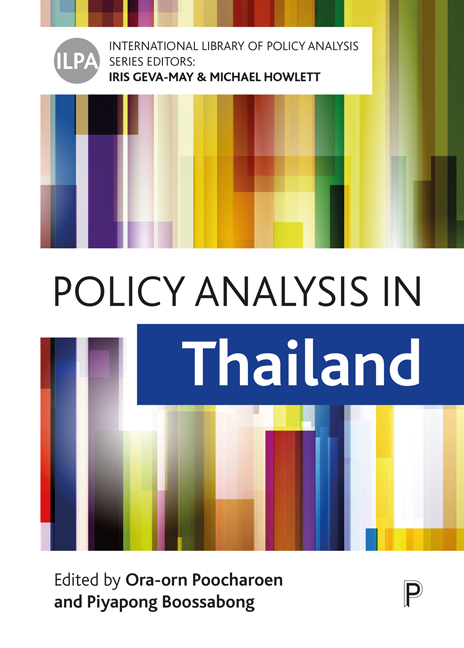Book contents
- Frontmatter
- Contents
- List of figures and tables
- List of abbreviations
- Notes on contributors
- Editors’ introduction to the series
- Introduction
- Part One History, styles and methods of policy analysis in Thailand
- Part Two Policy analysis within executive government
- Part Three Policy analysis beyond executive government
- Part Four Political parties and interest groups in policy analysis
- Part Five Policy analysis education and research
- Index
one - History and styles of policy analysis in Thailand
Published online by Cambridge University Press: 20 January 2024
- Frontmatter
- Contents
- List of figures and tables
- List of abbreviations
- Notes on contributors
- Editors’ introduction to the series
- Introduction
- Part One History, styles and methods of policy analysis in Thailand
- Part Two Policy analysis within executive government
- Part Three Policy analysis beyond executive government
- Part Four Political parties and interest groups in policy analysis
- Part Five Policy analysis education and research
- Index
Summary
Introduction
Similar to many countries, policy analysis in Thailand still faces unequal power relations and weak democratic governance. Thai policy makers and analysts still depend mainly on technical policy knowledge from abroad. Under the incoherent governance structures, there are many gaps and conflicting values to be defined. To review the history of policy analysis and capture Thai policy styles, thus, requires a critical assessment and even a reinterpretation of the formal stories that have been told so far. This chapter aims to examine Thailand's chaotic and complex historical background as well as Thai styles of policy analysis.
This chapter also plays an important role in providing grand narratives and the main turns – clear changes – in the field of public policy analysis in Thailand. Exploring these grand narratives and turns will help to determine the important shifts and draw a holistic picture of the policy landscape of the country before the subsequent chapters, which are more focused and go deeper into details. However, it should be noted here that this chapter does not aim to provide a linear and non-subjective explanation. Different interpretations, therefore, are possible and should be proposed to stimulate the ongoing dialogue on the histories and styles of policy analysis in Thailand.
Historical background of policy analysis in Thailand
To make clear distinctions in time periods of policy analysis in Thailand is certainly impossible as clear historical breaking points cannot be identified. However, there should still be attempts to capture the main changes. Therefore, this chapter proposes five periods classified according to the commonalities and connected critical events of that period. The first period of policy analysis, 1899– 1956, is defined by the governmental instruments and bureaucratic practices of the elites. Then, the second period, 1956– 1978, can be perceived as policy analysis under the shadow of the American system. After that, the third period is the period of policy analysis during the rise of think tanks, corporations and money politics between 1979 and 1996. With the severe economic crisis and political movement towards the people's constitution, the fourth period of policy analysis, 1997– 2006, coincides with the rise of people's demand for participation, an emerging governance system and populism.
- Type
- Chapter
- Information
- Policy Analysis in Thailand , pp. 11 - 27Publisher: Bristol University PressPrint publication year: 2023



